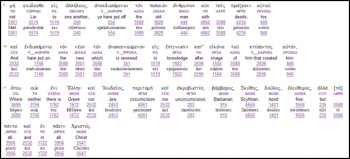What is interesting to me is that you come up with the same age (this method give us 56 years old) via a detailed timeline. It also solves a few issues (like Joseph really not born when Jacob was in his "old age" as all but Benjamin were born within Jacob's first 7 years of marriage).
John, again you are relying on a mythical understanding that Jacob only spent 20 years in Haran, but the reality, if you do a timeline from scripture, is that Jacob statement of how many years he spent with Laban, clearly indicates that he spent 40 years living in Haran working for Laban.
If you look at the timeline of the births of Jacob sons, then, Rueben, his first born son, to his first wife, Leah, was probably born in the 8th year of his time in Haran, then Leah gave birth to another three sons, in quick succession possibly over a period of 4 to 5 years before she stopped bearing children for a period of time. Then Rachel gave Jacob her handmaiden, Bihah, to Jacob, as a wife, and within 1 year, probably, she had given birth to her first born son, Dan, and then within one or two years later she bears another son with Jacob, named, Naphtali, before she stops bearing children.
Then Lear gives he handmaiden, Zilpah, who probably within one year also bears Jacob a son, Gad, and then within one to two years also bears Jacob a second son, Asher.
Some time after this, Leah buys time in Jacob's bed using Rueben's mandrakes, and also bears Jacob another son, Issachar, and within one or two years then bears Zebulun. Then Leah also bears Jacob a daughter, Dinah, possibly one to two years later.
All of the above probably occurred within the first 22 years of Jacob living in Haran. He was possibly around 64 years old at this time.
It was not for another 10-11 years before Rachel bore Jacob a son, after God had opened her womb, and she gave birth to a son, Joseph, when Jacob was probably around 74-75 years old.
Six years later, Jacob flees from Laban while Rachel was carrying her second child, who was born near Bethlehem. It should be remembered that Rachel told her father that she could not get up for him from the saddle bags where she had hidden the household idols/gods, was in the way of women, i.e. being pregnant.
The above goes a long way in confirming that Jacob spent 40 years in Haran and not 20 years as your scenario above suggest. The commentator on the story of Jacob also got this wrong as well as the age of Joseph when his brothers first turned up in Egypt to get grain from him.
We now have the incident in Shechem of the Prince of the city bedding Dinah, and her brothers response of kill the men in Shechem because of this incident. Dinah would have been around the age of 18 to 19 years old when she "put" herself into the prince's bed. She may not have been completely innocent in this "crime of passion."
Jacob then moves quickly on from Shechem and near Bethlehem Rachel gives birth to her second son, Benjamin, before she dies during the birth of her second son. Rachel could have been around the age of 62 years old when she died. Jacob was possibly around the age of 83 year old when Benjamin was born.
In the above I have set out the timeline of Jacob covering the time period of the begetting of all of his sons.
Jacob's first 11 sons were born, from my research in establishing a time line for the book of Genesis, over a period of around 26 years and not as you have suggested over a period of only 6 - 7 years. The numbers do not work.
Joseph was some 15-26 years younger than his older brothers.
John you have again relied on what you have read rather than confirming what the other commentator have claimed.
We all need to meditate on the scriptures and put God's words to us into His context and not fit them into our poor "logical" reasoning.
Shalom





